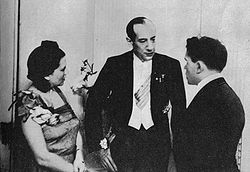
Nikolai Sharonov
Encyclopedia

Soviet Union
The Soviet Union , officially the Union of Soviet Socialist Republics , was a constitutionally socialist state that existed in Eurasia between 1922 and 1991....
diplomat.
Plenipotentiary
Plenipotentiary
The word plenipotentiary has two meanings. As a noun, it refers to a person who has "full powers." In particular, the term commonly refers to a diplomat fully authorized to represent his government as a prerogative...
(полпред) on a shared basis, sometimes via third countries, in Greece (1937–1939), Albania
Albania
Albania , officially known as the Republic of Albania , is a country in Southeastern Europe, in the Balkans region. It is bordered by Montenegro to the northwest, Kosovo to the northeast, the Republic of Macedonia to the east and Greece to the south and southeast. It has a coast on the Adriatic Sea...
(1937–1939), Poland (1939) and Hungary (1939–1941).
He was the last Soviet ambassador in the Second Polish Republic
Second Polish Republic
The Second Polish Republic, Second Commonwealth of Poland or interwar Poland refers to Poland between the two world wars; a period in Polish history in which Poland was restored as an independent state. Officially known as the Republic of Poland or the Commonwealth of Poland , the Polish state was...
(replacing Yakov Davydov
Yakov Davydov
Yakov Khristoforovich Davydov was, as head of the Cheka's Foreign Department from 1921 to 1922, the first head of Soviet foreign intelligence....
, executed in the Great Purge
Great Purge
The Great Purge was a series of campaigns of political repression and persecution in the Soviet Union orchestrated by Joseph Stalin from 1936 to 1938...
). He took this post in May 1939. Officially, in light of the growing Polish-German tensions, he supported the Polish government, offering to discuss Soviet economic and military aid; In fact the Soviets were pressured by the Nazi Germany
Nazi Germany
Nazi Germany , also known as the Third Reich , but officially called German Reich from 1933 to 1943 and Greater German Reich from 26 June 1943 onward, is the name commonly used to refer to the state of Germany from 1933 to 1945, when it was a totalitarian dictatorship ruled by...
to act upon their alliance (Ribbentrop-Molotov Pact); Soviet propaganda was already accusing Poland of border violations and mistreatment of Belorussian and Ukrainian minorities
Ukrainian minority in Poland
The Ukrainian minority in Poland is composed of 27,172 people according to the Polish census of 2002. Most of them live in the Warmian-Masurian Voivodeship , followed by West Pomeranian , Podkarpackie and Pomeranian Voivodeship ....
, and mobilization
Mobilization
Mobilization is the act of assembling and making both troops and supplies ready for war. The word mobilization was first used, in a military context, in order to describe the preparation of the Prussian army during the 1850s and 1860s. Mobilization theories and techniques have continuously changed...
was ordered on September 7. It is not certain whether Sharonov was aware of larger Soviet policy and was acting in good faith, without consulting with Soviet government, or whether he was trying to divert Polish government attention from Soviet preparations. Sharonov and his military attaché
Military attaché
A military attaché is a military expert who is attached to a diplomatic mission . This post is normally filled by a high-ranking military officer who retains the commission while serving in an embassy...
, Pavel Rybalko
Pavel Rybalko
Marshal of the Armoured Troops Pavel Semjonovich Rybalko was a commander of armoured troops in the Red Army during and following World War II.-Pre-war:Pavel Rybalko served in the Russian and then the Soviet Army from 1914...
, left Poland on 11 or 12 September 1939, less than a week before Soviet Union invaded Poland
Soviet invasion of Poland (1939)
The 1939 Soviet invasion of Poland was a Soviet military operation that started without a formal declaration of war on 17 September 1939, during the early stages of World War II. Sixteen days after Nazi Germany invaded Poland from the west, the Soviet Union did so from the east...
. Sharonov's official reason for leaving Polish capital of Warsaw
Warsaw
Warsaw is the capital and largest city of Poland. It is located on the Vistula River, roughly from the Baltic Sea and from the Carpathian Mountains. Its population in 2010 was estimated at 1,716,855 residents with a greater metropolitan area of 2,631,902 residents, making Warsaw the 10th most...
was "the troubles in establishing communications with Moscow" due to the ongoing German invasion of Poland that begun on September 1.

